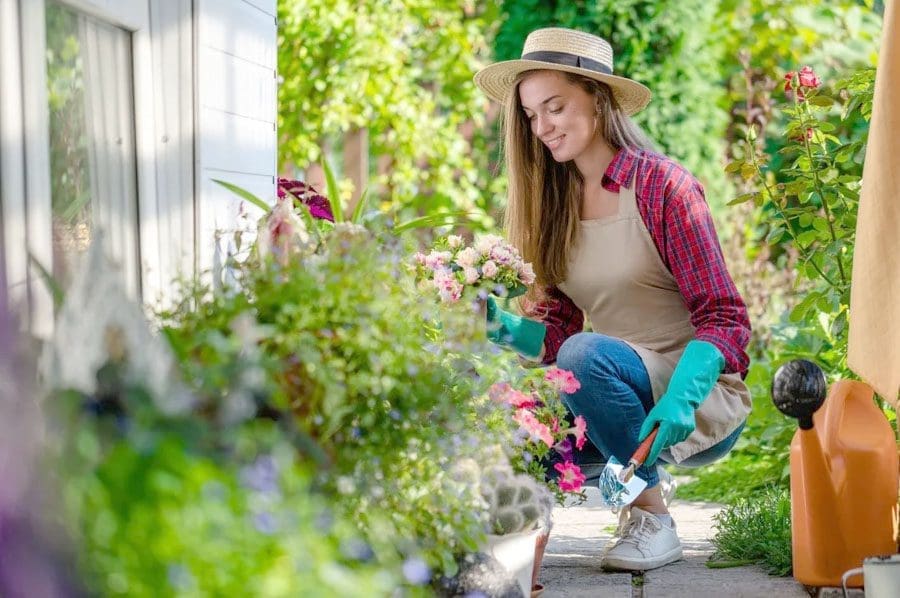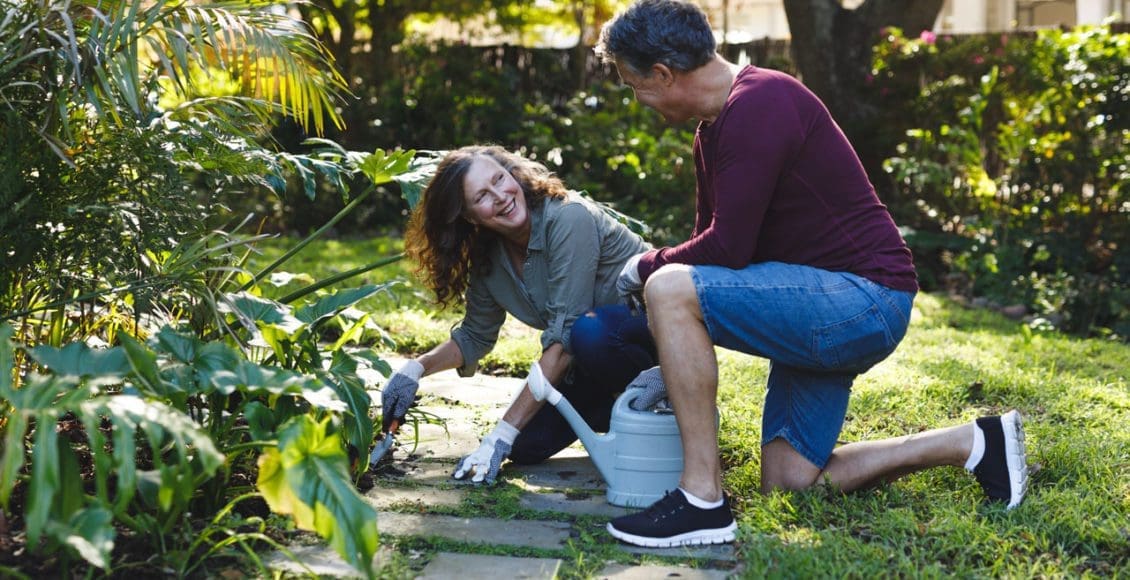Gardening is healthy for the body and does count as exercise, which works the major muscle groups that include the neck, shoulders, arms, abdomen, back, glutes, and legs. However, gardening can cause stress to the body with unhealthy posture/positioning, not using proper lifting techniques, using the wrong tools, and not taking breaks to stretch out the body, move around, and rehydrate. This can lead to body soreness, pain, and injuries. Here are some recommended gardening tips and stretches for pain prevention.

Table of Contents
Gardening Tips and Stretches
A sore back and body can stem from staying in a single posture for too long and repetitive motions/movements. Here are a few tips to help maintain musculoskeletal health while gardening:
Tools
- Choosing the right garden tools can spare a lot of pain and money.
- Focus on the fundamental tools and purchase the best quality tools that the budget will allow.
- Size weight, task level, material, grips, handle length, and attachments are things to consider
- Maintaining quality tools will go a long way.
Digging
- Digging requires the right tools to get the job done safely and efficiently.
- Make sure the shovel is sharp enough to reduce using extra force to break up the dirt.
- The shovel handle should be long enough to avoid excessive bending.
- Utilize proper digging posture while using a shovel.
- If using too much pressure, soak the soil to loosen it up.
- Try not to twist when shoveling the dirt/soil; instead, move the whole body to where the dirt needs to be.
Lifting
- Prolonged lifting of bags, plants, pots, and equipment can take a toll on the spine and spinal muscles.
- Bend the knees and use the hips to lift, as the hip muscles are stronger than the low back muscles.
- Do not bend the waist to come back; use the hips.
- Investing in an elevated garden or gardening seat/stool is recommended to avoid bending.
Weeding
- Weeding can require prolonged sitting or bending, depending on the number of weeds.
- To avoid excessive sitting and bending, a gardening seat/stool can help, as well as a standing weeding tool will reduce the pressure on the back.
- This is also helpful for knee and/or hip pain.
Mowing
- Mowing with poor technique and improper posture can lead to increased strain and pain.
- This includes using proper arm positioning with a slight bend at the elbow and the mower handle at a comfortable level.
Take Breaks
- Do not push through; take a break even if the body feels great.
- Every half hour, the body needs to rest.
- Try to work in 30-minute increments then break to move around, stretch, relax, and rehydrate.
- Squatting, bending, digging, lifting bags, and pushing wheelbarrows is a form of strength training that helps achieve stronger muscles, healthier bones, and joints.
- But if there are no breaks, the chances for pain and injuries increase.
Stretches
Simple stretches can reduce the strain and pain of gardening. Stretching before, during, and after the gardening session is recommended.
Cat Stretch
- This is a simple yoga pose that helps with back soreness.
- On your hands and knees, keep the hands at shoulder distance and the knees at hip distance.
- Pull the navel up to the spine and arch/round the back.
- Slowly straighten the back.
Cow Stretch
- The cow stretch is the opposite of the cat pose.
- Start in the same position.
- Drop the stomach to the floor and lift the head up and back.
- The spine will arch and gently stretch the back.
Head Rolls
- Head rolls will help with shoulder and neck pain.
- Drop the chin down toward the chest.
- Gently roll the head to one side going around back to the center.
- Repeat in the opposite direction.
Supine Twists
- Supine twists can help the lower back.
- Lay down with the legs at a 45-degree angle and the arms out to the sides.
- Twist the legs to one side and look in the opposite direction.
- Hold the pose until the stretch is felt, and then move back to the starting point.
- Repeat on the opposite side.
Chiropractic
Chiropractic medicine can help alleviate aches and pains and rehabilitate, realign, and strengthen the body to optimal health. Individuals are educated on the musculoskeletal system, injury prevention, nutrition, and exercise to maintain wellness and a pain-free lifestyle.
Pain-Free Gardening Tips and Stretches
References
Howarth, Michelle et al. “What is the evidence for the impact of gardens and gardening on health and well-being: a scoping review and evidence-based logic model to guide healthcare strategy decision making on the use of gardening approaches as a social prescription.” BMJ open vol. 10,7 e036923. 19 Jul. 2020, doi:10.1136/bmjopen-2020-036923
Masashi Soga A et al. “Gardening is beneficial for health: A meta-analysis” https://www.ncbi.nlm.nih.gov/pmc/articles/PMC5153451/pdf/main.pdf.
Scott, Theresa L et al.”Positive aging benefits of home and community gardening activities: Older adults report enhanced self-esteem, productive endeavors, social engagement, and exercise” SAGE open medicine vol. 8 2050312120901732. 22 Jan. 2020, doi:10.1177/2050312120901732
Post Disclaimer
Professional Scope of Practice *
The information on this blog site is not intended to replace a one-on-one relationship with a qualified healthcare professional or licensed physician and is not medical advice. We encourage you to make healthcare decisions based on your research and partnership with a qualified healthcare professional.
Blog Information & Scope Discussions
Welcome to El Paso's Premier Wellness and Injury Care Clinic & Wellness Blog, where Dr. Alex Jimenez, DC, FNP-C, a board-certified Family Practice Nurse Practitioner (FNP-BC) and Chiropractor (DC), presents insights on how our team is dedicated to holistic healing and personalized care. Our practice aligns with evidence-based treatment protocols inspired by integrative medicine principles, similar to those found on this site and our family practice-based chiromed.com site, focusing on restoring health naturally for patients of all ages.
Our areas of chiropractic practice include Wellness & Nutrition, Chronic Pain, Personal Injury, Auto Accident Care, Work Injuries, Back Injury, Low Back Pain, Neck Pain, Migraine Headaches, Sports Injuries, Severe Sciatica, Scoliosis, Complex Herniated Discs, Fibromyalgia, Chronic Pain, Complex Injuries, Stress Management, Functional Medicine Treatments, and in-scope care protocols.
Our information scope is limited to chiropractic, musculoskeletal, physical medicine, wellness, contributing etiological viscerosomatic disturbances within clinical presentations, associated somato-visceral reflex clinical dynamics, subluxation complexes, sensitive health issues, and functional medicine articles, topics, and discussions.
We provide and present clinical collaboration with specialists from various disciplines. Each specialist is governed by their professional scope of practice and their jurisdiction of licensure. We use functional health & wellness protocols to treat and support care for the injuries or disorders of the musculoskeletal system.
Our videos, posts, topics, subjects, and insights cover clinical matters and issues that relate to and directly or indirectly support our clinical scope of practice.*
Our office has made a reasonable effort to provide supportive citations and has identified relevant research studies that support our posts. We provide copies of supporting research studies available to regulatory boards and the public upon request.
We understand that we cover matters that require an additional explanation of how they may assist in a particular care plan or treatment protocol; therefore, to discuss the subject matter above further, please feel free to ask Dr. Alex Jimenez, DC, APRN, FNP-BC, or contact us at 915-850-0900.
We are here to help you and your family.
Blessings
Dr. Alex Jimenez DC, MSACP, APRN, FNP-BC*, CCST, IFMCP, CFMP, ATN
email: coach@elpasofunctionalmedicine.com
Licensed as a Doctor of Chiropractic (DC) in Texas & New Mexico*
Texas DC License # TX5807
New Mexico DC License # NM-DC2182
Licensed as a Registered Nurse (RN*) in Texas & Multistate
Texas RN License # 1191402
ANCC FNP-BC: Board Certified Nurse Practitioner*
Compact Status: Multi-State License: Authorized to Practice in 40 States*
Graduate with Honors: ICHS: MSN-FNP (Family Nurse Practitioner Program)
Degree Granted. Master's in Family Practice MSN Diploma (Cum Laude)
Dr. Alex Jimenez, DC, APRN, FNP-BC*, CFMP, IFMCP, ATN, CCST
My Digital Business Card


